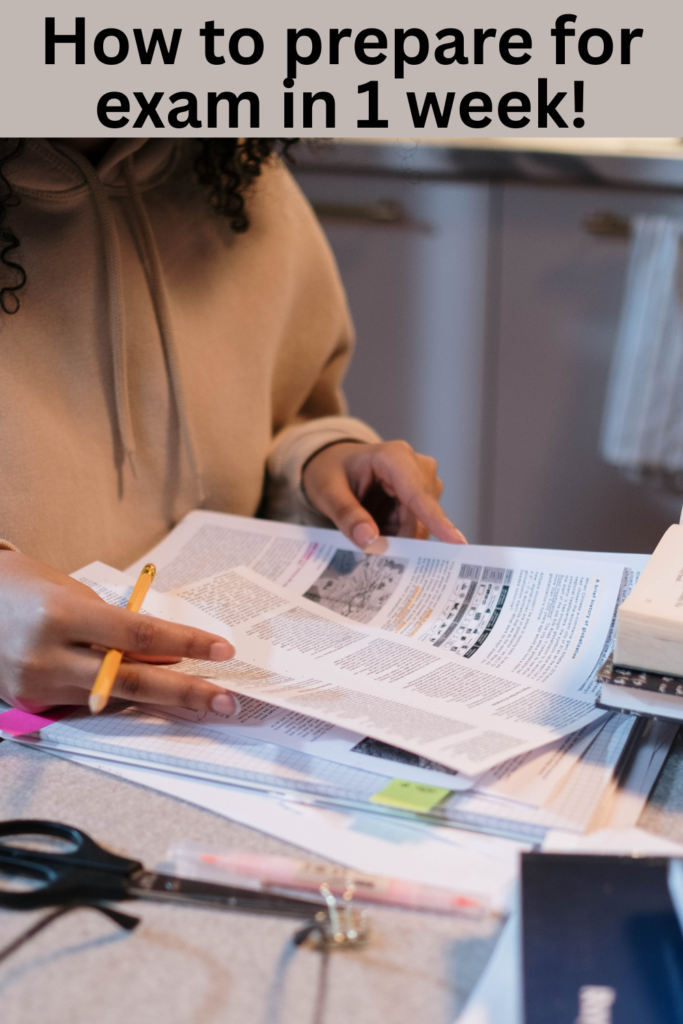How to Prepare for Exams When You Feel Behind, Lost, or Just Overwhelmed
Let me be honest with you…
I’ve Googled how to prepare for exams more times than I can count. Usually at midnight. Usually when I was already panicking about how much I had left to do. Most of the advice out there? It feels copy-pasted. Make a schedule, get 8 hours of sleep, drink water. Sure, it’s valid—but it doesn’t feel like it gets what you’re going through.
Because when you’re one week (or a few days) out from exams, and your brain is already tired, you need more than “eat a healthy snack.” You need a plan that feels doable, one that fits real life, and actually helps you feel in control again.
So if you’ve been wondering how to prepare for exams in a way that makes sense for you—especially when you’re behind, distracted, or just mentally drained—this is the guide I wish I had back then.
Table of Contents
1. How to prepare for exams when your notes are a mess
I get it—you open your notebook or digital files and it’s all over the place. Scribbled lecture notes, half-written headings, maybe a few doodles when you zoned out in class.
So here’s what I do: I don’t waste time trying to rewrite or organize it all perfectly. I talk it out.
Instead of rereading messy notes, I open my voice recorder app and start explaining each topic like I’m teaching someone else. It sounds weird, but this method has completely changed how I prepare for exams. You’re not just reviewing—you’re processing. And by listening back to yourself later, you’re reinforcing it without opening your books again.
When people ask me how to prepare for exams effectively without redoing all their notes, this is my go-to strategy. It saves time, boosts memory, and feels way less overwhelming.

2. How to prepare for exams when you’ve procrastinated (a lot)
Let’s be real—you probably didn’t plan to leave it this late. I didn’t either. But here’s what I’ve learned: you can still make real progress if you stop trying to do everything.
I’ve tried cramming everything into one night. I’ve also tried breaking down topics into micro-tasks—one subtopic at a time, one question at a time. Guess what worked better?
When you’re figuring out how to prepare for exams last-minute, your goal isn’t to master the syllabus. Your goal is to prioritize smartly and act quickly. I ask myself: What 20% of topics will get me 80% of the marks?
Then I start there. No guilt. No panic. Just one focused hour at a time.
3. How to prepare for exams if you can’t sit still
You know those study hacks that say “study for 3 hours straight”? Yeah, that doesn’t work for me. I get restless. My focus slips. So I started prepping for exams on the move.
Here’s my weird but life-saving trick: I walk around my room or campus while explaining concepts out loud. I call it “study walking.” It’s like giving a TED Talk to nobody. But it works. I stay alert, I remember things better, and I don’t fall asleep over my notes.
This is how I learned how to prepare for exams without having to force myself into a chair for hours. You can learn more in less time just by changing your study environment and letting your body move.

4. How to prepare for exams when your brain is tired
There’s a point in every study session where your brain just says: “Nope.” You keep reading the same line, but nothing sticks. I’ve hit that wall too.
Instead of pushing harder, here’s what I do: I switch to mental flashbacks.
I close my eyes, pick a topic, and try to recall whatever I remember—without notes, without writing. Just pure recall. I imagine teaching it. Sometimes, I even draw it in the air with my finger. It’s weird. It’s quiet. And it works like magic.
If you’re asking how to prepare for exams when your mental energy is low, this is a gentle, passive recall method that builds memory without frying your brain.
5. How to prepare for exams when you’re studying multiple subjects at once
Juggling subjects is a mental workout. You finish a math chapter and then have to jump into essay mode. It’s exhausting.
So I created a pattern that I call “mental batching.” If I’m doing content-heavy subjects like biology, history, or law, I batch them together. If I’m doing problem-solving ones like physics or math, I group those separately. I never switch between completely different brain modes in one study block.
This small change helped me learn how to prepare for exams without burning out. When your brain knows what kind of work is coming next, it saves energy. And trust me, every ounce of energy counts during exam prep.
6. How to prepare for exams without studying all day
You don’t need to study for 12 hours a day to do well. What you need is quality over quantity. And the best way I’ve found to do that? Time-capped sprints.
I set a timer for 45 minutes. I choose one topic, one task. That’s it. I go all in. Then I take a full 15-minute break—no guilt, no half-studying while scrolling.
Doing 4–5 of these a day helped me figure out how to prepare for exams efficiently. The trick isn’t to do more—it’s to focus harder in less time. You’ll get better results and feel way less drained.

7. How to prepare for exams when anxiety kicks in
Exams can mess with your head. Sometimes it’s not the lack of preparation—it’s the fear. That tight feeling in your chest when you look at your books? Yeah, I’ve felt it too.
So here’s my honest answer to how to prepare for exams when you’re anxious: disconnect performance from self-worth. You are not your grade. You are not your last test result. You are a learner, and this is just a checkpoint—not a final judgment.
And when it gets too much, I do breathing resets. 4 seconds in, 4 seconds hold, 4 seconds out. Repeat. Then I write one thing I do understand today. It rewires my brain to focus on what’s working.
You won’t always feel calm. But you can learn how to move forward despite the anxiety. That’s a skill worth keeping for life.
8. How to prepare for exams when nothing feels enough
I used to chase that “one more topic” feeling. I kept going, even when I knew I needed a break. But here’s what changed for me: I started giving myself permission to pause without panic.
Sometimes the best thing you can do for your grades is to take a 30-minute walk, call a friend, or take a power nap. This is part of the process. Not a break from studying—a break that fuels studying.
When I finally understood this, I stopped burning out. I stopped chasing perfect and started showing up with energy and clarity. That’s how to prepare for exams like a real human being—not a robot.

Conclusion: You Don’t Need to Be Perfect—You Just Need to Begin
If you’ve made it this far, you already care about doing well. That means you’re halfway there. The truth about how to prepare for exams is that it’s less about doing everything, and more about doing the right things—based on how you learn best.
You don’t need a fancy study plan. You don’t need to pull all-nighters or go through 300 flashcards. You just need small, consistent actions that make sense to you.
So if you’re behind, anxious, or unsure where to start—just pick one of these tips. Try it today. Then build from there.
Because you already know how to prepare for exams deep down—you just need to trust yourself a little more.
And I promise, you’ve got this.






